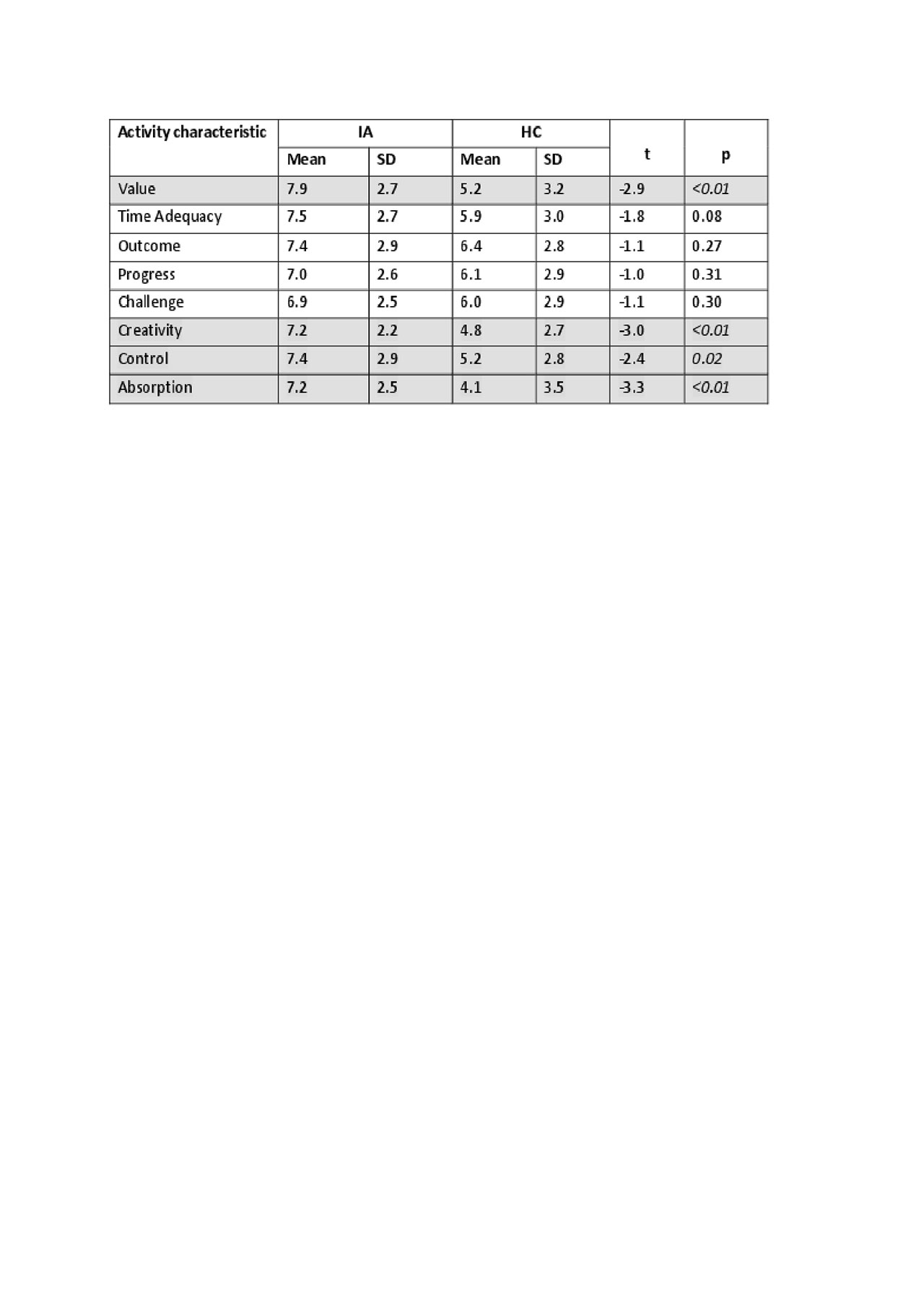Session Information
Date: Tuesday, November 12, 2019
Title: Epidemiology & Public Health Poster III: OA, Gout, & Other Diseases – ARP
Session Type: Poster Session (Tuesday)
Session Time: 9:00AM-11:00AM
Background/Purpose: Inflammatory arthritis (IA) can disrupt a person’s valued life activities but little is known about the potential health benefits of activities other than physical activity. This study explores (a) differences in activity characteristics between adults with and without IA, and (b) the relationships between activity characteristics and health and well-being. Understanding how people characterize their activities and how these activities impact health can help advance arthritis care.
Methods: We conducted a cross-sectional study (as the first phase of a larger longitudinal study) with 40 non-smoking adults, 20 with IA (confirmed by a rheumatologist) and 20 healthy controls (HC). Participants were recruited via clinic and community advertising. Demographic data included age, sex, diagnosis, and employment status. Activity characteristics were measured using Personal Projects Analysis: participants identify 10 salient, goal-directed activities and rate them on 19 characteristics (e.g., creative, absorbing, stressful) using a 11-point scale (e.g., 10=highly creative, 0=not at all creative). Health status indicators were the SF-36 health survey and telomere length (TL), measured from dried blood spots using the monochrome multiplex qPCR method. Descriptive statistics, t-tests, and correlation coefficients were calculated.
Results: Participants’ mean age was 54 (SD=15.6); 82.5% were women. Mean age and proportion of women did not differ between groups. In the IA group 65% had RA, 20% lupus, 5% JIA, and 10% had both RA and lupus. In the IA group the highest ranked activity characteristics were value, time adequacy, and outcome, and in the HC group they were outcome, progress, and challenge. Significant between-group differences include creativity, value, control, and absorption. See Table 1. In the total sample, the SF-36 physical component score (PCS) was most strongly associated with value (r= -0.56, p < 0.001) and creative (r= -0.38, p= 0.02) activity characteristics. The SF-36 mental component score (MCS) was most strongly associated with stress (r= -0.48, p= 0.002) and difficulty (r= -0.43, p= 0.006). TL was most strongly associated with importance (r= -0.33, p = 0.04) and value (r=-0.33, p= 0.04). The correlation between TL and MCS (r= -0.36, p= 0.02) was stronger than TL and PCS (r= 0.22, p= 0.17). PCS score was significantly higher in the HC group than the IA group. See Table 2 for health outcomes between groups.
Conclusion: There are differences in how adults with and without IA characterize their daily activities. Our results show that people with IA engage in more activities of positive characteristics than those without IA. Perhaps having arthritis compels patients to engage in more valued activities; however, this requires further exploration. A better understanding of these differences may provide insight to future activity recommendations to support physical and mental health. Although preliminary, the finding that TL is associated with ratings of activity importance and value, while self-reported MCS was associated with activity stress and difficulty, suggests interesting hypotheses for future studies examining how certain activity characteristics accrue different health benefits.
To cite this abstract in AMA style:
To-Miles F, Forwell S, Puterman E, Backman C. The Health-promoting Potential of Everyday Activities: Preliminary Results from an Exploratory Study of Adults with and Without Inflammatory Arthritis [abstract]. Arthritis Rheumatol. 2019; 71 (suppl 10). https://acrabstracts.org/abstract/the-health-promoting-potential-of-everyday-activities-preliminary-results-from-an-exploratory-study-of-adults-with-and-without-inflammatory-arthritis/. Accessed .« Back to 2019 ACR/ARP Annual Meeting
ACR Meeting Abstracts - https://acrabstracts.org/abstract/the-health-promoting-potential-of-everyday-activities-preliminary-results-from-an-exploratory-study-of-adults-with-and-without-inflammatory-arthritis/


